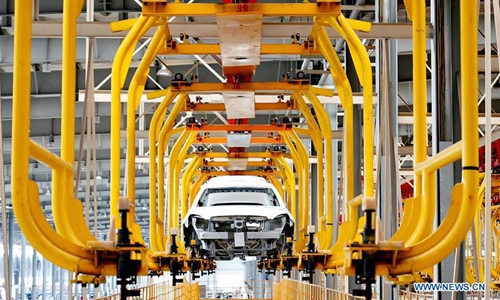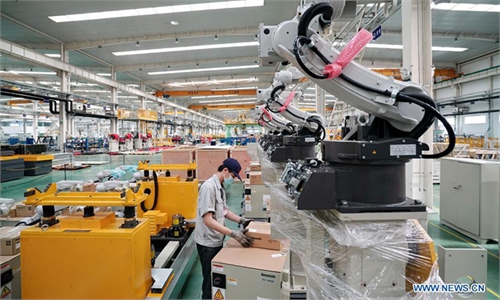
China's manufacturing PMI Photo: Xinhua
The Caixin manufacturing Purchasing Managers' Index (PMI), which gauges China's most privately-run middle and small-size manufacturers, came in at 50.3 in July, nearly matching the official PMI, down from 51.3 in June and at the lowest point since May 2020.
The trend seen in the most recent Caixin manufacturing PMI was the same as the official PMI released by the National Bureau of Statistics on Saturday, which came in at 50.4, down from 50.9 in June and at the lowest point since March 2020.
The output of the manufacturing sector continued to expand but at a lower speed, and demand decelerated for the first time in more than one year.
The production sub-index fell to a 16-month low in July, while the new order sub-index hit the lowest point in 15 months, Chinese financial news site caixin.com said in a report announcing the monthly survey results.
Surveyed enterprises said that market demand was softening and elevated production prices had capped selling volumes.
The purchasing sub-index and the producer price sub-index of the manufacturing sector both declined in July, which showed the easing pressure of inflation.
Interviewed enterprises said that prices of raw materials such as industrial metals remained high. The producer price index was at the lowest point since October 2020, which showed that the market was price-sensitive, limiting companies' pricing power.
Restricted by China's regional floods, COVID-19 outbreaks and an ongoing chip shortage, logistics efficiency declined. Enterprises had to fill orders from existing inventories, and the number of products made declined, said the Caixin survey.
Surveyed enterprises generally reacted positively to the development potential of China's manufacturing sector, although their optimism slid to the lowest point in 15 months.
The major factor affecting sentiment was the stability of supply chains, which were affected by the uncontrolled overseas pandemic.
Global Times



